
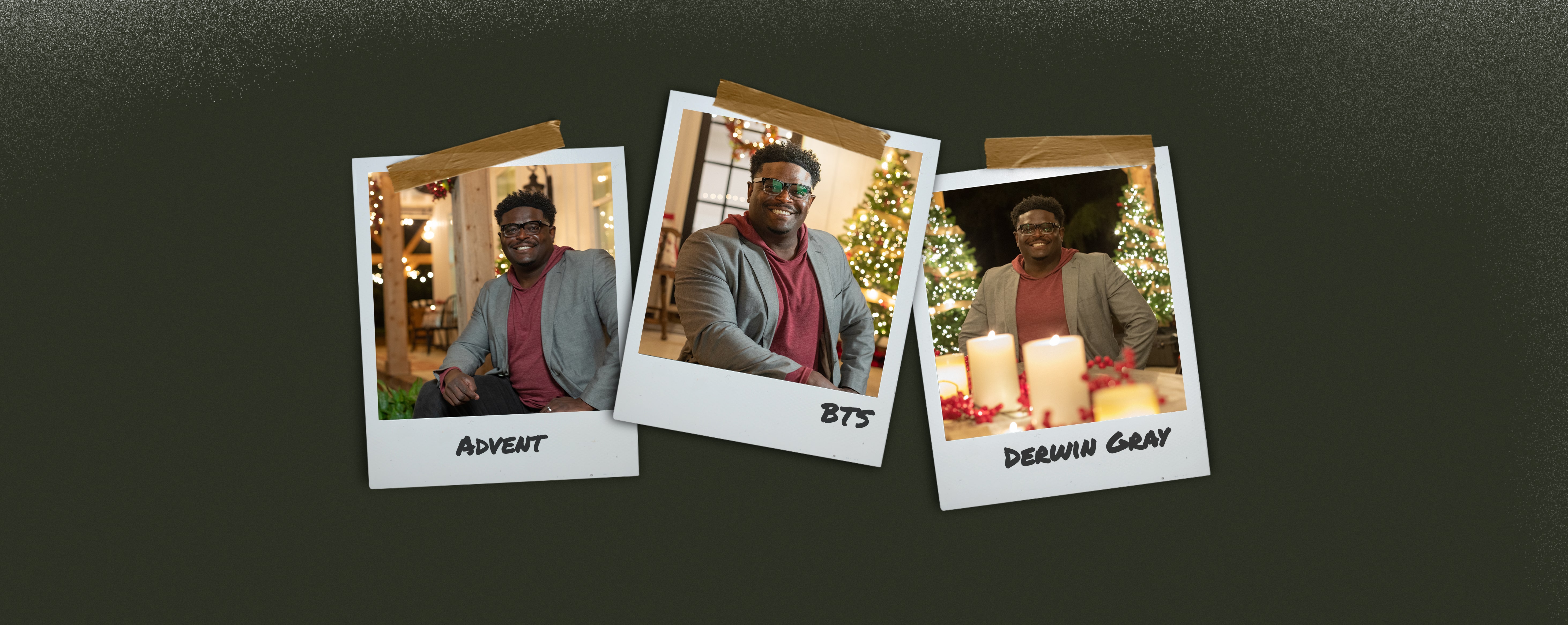
The Christmas season is full of light, joy, and beauty. At the center of our celebrations and family traditions is a vulnerable baby in a feeding trough—Emmanuel, God with us. As Christmas approaches, the season of Advent offers us a chance to reflect on our savior, his purpose, and the surprising ways he invited people near to him.
To help you and your church reflect on the coming, or advent, of Christ, pastor Derwin Gray spent time with our team filming Advent, a five-part series exploring the ways the birth of Jesus changes everything. We caught up with Derwin after he preached at the RightNow Conference to hear about his experience making this series and his hope for everyone who watches it.
Derwin: Filming with the RightNow Media team is not only fun—because they are all hilarious and we have good chemistry because they are great people—but also, they have professional expertise. The way they are able to take content and match it with locations and editing encourages me in my faith. I am excited about this Advent series because they make me better than I am!
Derwin: The biggest thing I learned about Advent was a greater awareness of God’s heart. Advent means “arriving” or “coming.” In the beginning, the Father had already determined that Jesus was going to come and reconcile all things to himself. The way he goes about that is beautiful, mysterious, life-giving, and powerful.
Derwin: I want them walking with Jesus more. Jesus is not just a Sunday friend; he is an all-week, all-the-time companion. He’s Lord. He’s Master.
The beauty of Advent is that we see the beauty and vulnerability of God entering into humanity in a fragile state and form. We see God use people to do incredible things! You don’t have to be the biggest or the best. Mary was just a teenager. Joseph was just some guy! God takes ordinary people and does extraordinary things.
So, I want people to be overwhelmed with God’s grace and the gift of his Son this Christmas.

The RightNow Media Team
If you’re a decision-maker at your organization, request a free consultation to find out how RightNow Media can equip and inspire your people.
Not a decision-maker?
Tell your pastor about RightNow Media instead.


Our production team holds themselves to a high standard of excellence. They work hard to find the best locations, the best teachers, and to film exciting and insightful content for your church and small groups. But every shoot has its own unique challenges and, sometimes, things don’t go exactly to plan.
While filming our upcoming series The Acts of the Apostles, our team and pastor Louie Giglio had to deal with unexpected weather changes and rogue tow trucks during a marathon two days of shooting. We caught up with Louie Giglio to learn about his experience filming this study, what God taught him while preparing his teaching, and his prayer for everyone who goes through this study of Acts.
Louie: It was your typical “I am doing something that is going to make a difference in the kingdom” experience. We recorded in an old factory in Atlanta—metal roof, open spaces, and open-air in many ways. The temperature inside was the same as the temperature outside and the beautiful weather we had the week before had turned into forty-nine degrees and pouring down rain. So, for two days, the amazing RightNow Media team shot this thing under not-the-best conditions.
We got one shot going, it was happening, we were rolling, and a guy comes driving up through the shot! His headlights were shining behind me right into the camera. A tow truck—because some people who had been at the building a few days before left a rental car there—came driving through the shot. I was talking about how the gospel is going to go to the ends of the world and he stops in the shot and starts to back up! BEEP BEEP BEEP. It was like, “Cut. Let’s start over. Hey, can you get your car and go, please?”
But that’s what it’s like when you are shooting one of these Bible studies. When you’re watching it, it’s so put together; the team does an amazing job! But it is a hustle to shoot because the enemy doesn’t want this message to get out. And we’re shooting this in the wild, so you never know what the next distraction will be.
It was like that for two straight days, but props to the RightNow Media team! They’re the best, they did a fantastic job. We had a bond like a family after going through a book like Acts. It was a family event. God was in it. I felt like I had run a marathon after the second day, but it was worth it!
Louie: I love the story of Acts because it’s our story. We are still living in the story of Acts. One of the things that really stuck out to me was as Paul was on his way to Rome—there was a shipwreck, a storm, they were wrecked on the island of Malta—the Bible says everyone was accounted for. Luke, who was writing this, says there were 276 people and they were all accounted for. God is writing a big global story, but he also knows every single one of us. We are all accounted for, and we all have a role in taking the name of Jesus to the ends of the earth.
Louie: You know, the place where we filmed this series was a working factory about a hundred years ago. On either side of the factory was a huge building with multiple train tracks going into it. Then there was another huge building on another side with lots of tracks leading into it. A small channel with a single set of tracks connected all the buildings. I don’t know what they made at this factory, but a train came into one building, a cart took something from that train across to the factory. Then, whatever they made, was taken from the factory to a departing train and sent away. Everything was connected.
As we shot, I thought, “That’s Acts. We are standing in Acts!” God brings the gospel to us in multiple tracks and stories, the gospel changes us, then he takes us somewhere else in the world to people who need to hear that story.
The takeaway from that story is that you are in Acts. It is not just about Peter, Stephen, Paul, Lydia, or all the churches that were planted. The Acts of the Apostles are still in motion taking the story of Jesus to all people. The gospel spread from Jerusalem to Judea, Samaria, and now to the ends of the earth. We are in Acts.


A holiday brimming with delicious food, time with family and friends, and lots of football, Thanksgiving is also a day to remember what we’re thankful for. For Christians, Thanksgiving presents an opportunity to reflect on all God has done and is doing and thank him.
Gratitude should mark the people of God, but we can be tempted to reserve it for a holiday or mealtime prayers. Paul exhorts us in 1 Thessalonians 5:18 to “give thanks in everything; for this is God’s will for you in Christ Jesus.” His command feels extreme—does he really want us to give thanks in everything? If so, what does gratitude even look like? How can we start building a habit of thanksgiving?
The good news is we can become grateful people by the power of the Spirit, and we can begin growing in gratefulness with one simple step: noticing what God is doing in our lives.
Paul mentions fourteen times in his letters that he thanks God for the people he’s writing to. Have you ever stopped to consider why he mentioned his gratefulness for his fellow Christians? Whether he is about to write words of rebuke or correction or encouragement, he still thanks God for the church—for people. He notices them. More importantly, he notices that God has orchestrated his relationship with them, that God put them in his life for a reason, and that God works in and through them.
Just as God brings people into our lives, he also places us in our neighborhoods, jobs, and churches. When he created the world, he put humans in it to live, grow, and take care of creation. Taking time to notice the world God put you in—your workplace, your home, your car, your church, your neighborhood park—can help cultivate gratitude in your heart. Yes, difficult places exist. Brokenness riddles our world. But God’s goodness, faithfulness, and kindness always shine forth through the brokenness for us to witness and thank him for.
Have you ever paused to notice a moment? Maybe the giggles of a playing toddler, the taste of a home-cooked meal, or the words of a hymn in Sunday worship. Or maybe you look back on past moments, spending time to reminisce with old college friends or to remember a loved one who’s passed away.
Past or present, moments encapsulate beauty. Slowing down to notice important or even seemingly insignificant moments can make us more grateful.
Taking notice of your people and your world—and seeing all of it as God-given, as proof of his love and grace—is the first step toward gratitude. When we know what to notice, we can move from simply observing our lives to giving thanks to God. Thanksgiving can look different for all of us, but there are a few practical ways we can weave it into our lives.
Keeping a gratitude journal is trendy for a reason. When we put pen to paper and list what we’re grateful for, we acknowledge what God has given us in a physical way. Regularly slowing down to thank God helps solidify gratitude in our hearts and builds our thankfulness muscle. Journals can also help us remember what God has done for us when we’re facing impossible, difficult situations. In many ways, it is an act of worship to write down what we are grateful for. Grab a journal or a pad of paper and try writing down three things you’re thankful for every day, then turn your list into a prayer of praise.
Gratitude is contagious. When we tell others what we’re thanking God for, we point them to gratefulness. Take a walk with a friend or call a family member and weave gratitude into your conversation organically. Notice how speaking with thankfulness about your life affects others. Or tell a significant person in your life that you are thankful for him or her and why, just as Paul did for the churches he wrote to.
Hardship often makes gratitude feel as impossible as asking the rain to stop pouring. When we face difficulty, the habits we’ve formed in calmer times come in handy. They give us the words to say when we have none to offer. Find verses on gratitude and memorize them (consider Psalm 100; Philippians 4:6–7; or 1 Thessalonians 5:18). Make a playlist of songs that express thanksgiving to God and return to it often. Or find a written prayer that thanks God that you can pray when words don’t come easily.
Gratitude transforms us. When we give thanks, we acknowledge God and his work in the world. We lift our eyes from looking at ourselves to see the spiritual reality of our lives.
God is at work. He always has been and always will be.
As you enter the holiday season, look for ways to build a lifestyle of gratitude. Invite your friends and family to join you and see how God grows joy, love, and hope in you as you thank him.
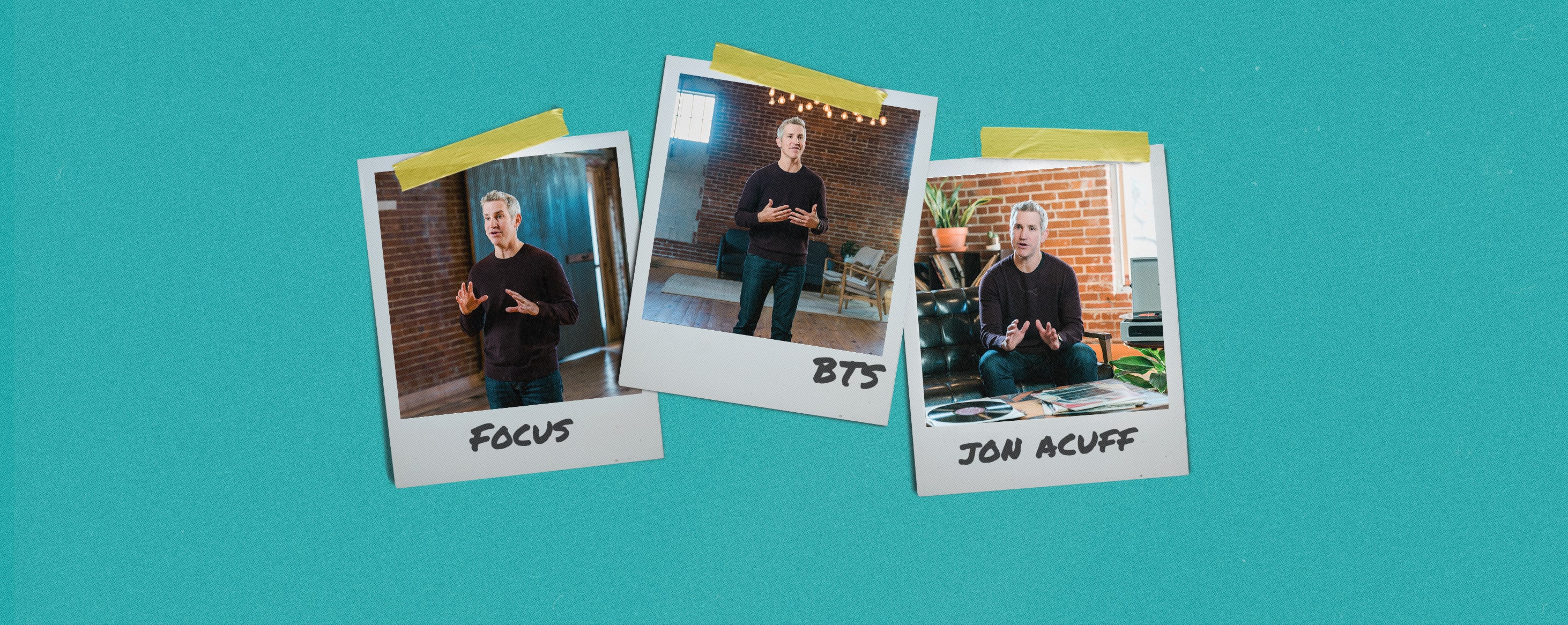

It’s no overstatement to say that we are more distracted now than we’ve ever been. The “chaos machine” in our pockets constantly diverts our attention away from what matters, gluing our eyes to the things that don’t. And with our attention goes our focus.
Addressing this very topic, New York Times bestselling author and speaker Jon Acuff recently filmed a new series with our team entitled Focus: In a World of Bottomless Distractions and Endless Opportunities. We caught up with Jon to hear what he learned while preparing this series and his hope for those who go through it.
Jon: One thing I learned is how distracted we all are. I like to say that our distraction technology has outpaced our ability to focus. Think about how fast distraction has scaled. I mean, twenty years ago the only distraction I had on my phone was a game called snake. I don’t know if you’re my age, but it just was a line that went “doot, doot, doot, doot, doot.” Now, you have every movie ever made, every book ever written, and every podcast ever recorded in your pocket. You have a chaos machine in your pocket. So, it was really interesting to learn—that’s part of why it’s challenging. You shouldn’t feel bad that it’s hard to focus; the odds are stacked against you because of our technology. But there are some really simple things you can do, and that’s what was so fun about filming this series.
Jon: I want viewers to walk away with the idea that you can learn how to focus. It’s not a personality trait. It’s not something that some people are good at and others are bad. When you talk to people about, “Is it easy for you to focus?” or “Do you ever get distracted?” sometimes they make identity statements. They say, “I’m a really distracted person. I can never focus,” as if they can’t learn. But the one thing I want you to walk away with is you can learn, and there’s some very practical things you can do that are actually really fun. And you get to see pretty quick progress. So I want you to walk away with the idea that you can do it and that there’s things you can do.
Jon: My most memorable moment of any series—we’ve done because we’ve done three together (so, I know I’m talking about Focus, but we’ve done Soundtracks and Finish)—my most memorable moment was where I got to the shoot and there was a cliff. They had set up the shoot on the edge of a cliff that was three-hundred feet high, overlooking a river, and there was a rock that was, in my opinion, very close to the edge of the cliff. And they said, “Hey, we just want you to stand on this rock, it’ll be an amazing shot.” And I said, “What’s your second idea?” Because I talk with my hands, I move around a lot, I’m very animated. So, I said, “There’s no way I’m getting on that rock.” So, if you watch that video, I’m perched on the rock. I’m sitting on the rock, that was our compromise, but I’m kind of looking over my shoulder. That was the most memorable. The second was, we filmed in Nissan Titan Stadium in Nashville, Tennessee, where I live. And it was an amazing shot, and they had a drone, and it was just gorgeous. So, I love partnering with RightNow because they always do such beautifully well-thought-out work.
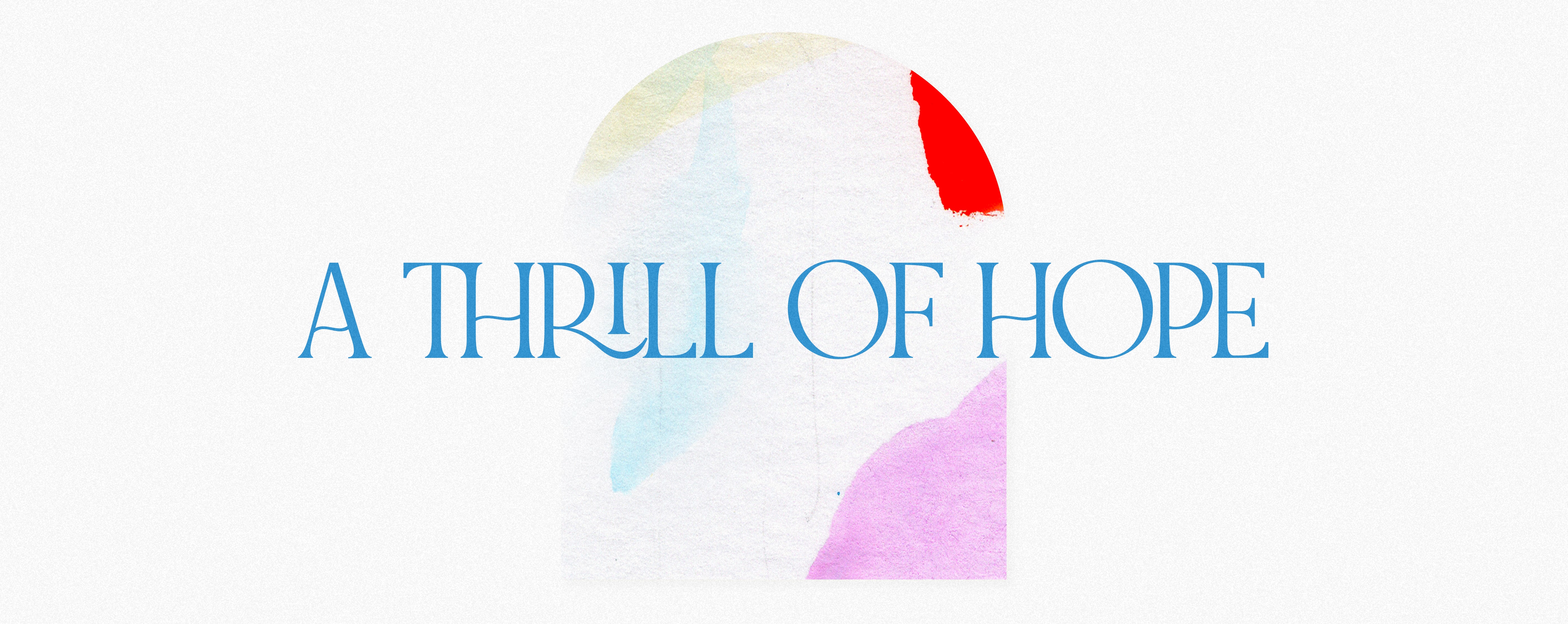

Jesus’s resurrection, as “O Holy Night” says, is the breaking of a “new and glorious morn.” That hymn, in fact, bears great significance for us this Easter season. In its first few lines, we find incredible hope:
“O holy night, the stars are brightly shining
It is the night of our dear savior’s birth.
Long lay the world in sin and error pining,
Till he appeared and the soul felt its worth.
The thrill of hope, the weary world rejoices,
For yonder breaks a new and glorious morn.”
Jesus’s birth held the promise of a new hope for those who were there to see it. Joseph and Mary and the shepherds were certain of the significance of the child laying in that borrowed feeding trough (Luke 2:7). The “Savior . . . who is the Messiah, the Lord” was “born for [them]” (Luke 2:11, CSB).
Thirty-three years later, the “new and glorious morn” was replaced with hopeless mourning. Jesus’s lifeless, broken body was being placed in a borrowed tomb, and the holiness of that first night was being called into question. The stars that shined so “brightly” at his coming were now dimmed with his apparent departure. The joy of the weary world gave way to deep, guttural groans of lament.
In the Garden of Eden, Adam and Eve chose to pluck a fruit that they weren’t yet allowed to harvest, and the thorny consequences of that first sin affect us to this day. With one ill-advised bite, the garden became a graveyard that spread death around the globe.
In John’s gospel, we first meet the resurrected Jesus in a graveyard outside the tomb he had once occupied. Mary, soaking the ground outside the tomb with her tears, hears the voice of someone behind her, presuming him to be the gardener.
What’s a gardener doing in a graveyard before sunrise?
Mary’s assumption about the man in the garden, who we know is Jesus, points us to a deeper truth. Jesus, beginning with his death and resurrection, is turning a graveyard into a garden, undoing the curse of sin. He is inaugurating and cultivating the new creation. He is resurrecting this death-soaked world.
The world now has a reason to rejoice.
We celebrate Easter because at the resurrection of Jesus—the new and better gardener—the world is in bloom again. We wear bright colors, sing resurrection hymns, and feast with family and friends because we carry with us the thrill of hope, for “He is risen! He is risen, indeed!”
We couldn’t sing “O Holy Night” without the empty tomb of resurrection morning. The “night of our dear savior’s birth,” would be like any other night if not for the thrilling refrain: “He is risen! He is risen, indeed!”
If you’re interested in learning more about the life of Jesus of Nazareth and the impact of his ministry, check out Journey with Jesus with Dr. Tony Evans, Chrystal Evans Hurst, and Priscilla Shirer.
.jpg)

Can we just skip the first seventeen verses of Matthew? The real story of Jesus starts when Joseph struggles with Mary’s news that she’s expecting a baby that isn’t his. At Christmastime, we want to read about dreams and angels and a baby’s birth, not a long list of “begats.”
Right?
Actually, no. Biblical authors always write with purpose. During this Advent season, as we anticipate the second coming of Jesus by contemplating his first coming, let’s consider what Matthew is teaching us through the orderly genealogy.
Including Jesus’s ancestry proves he was born specifically into the family of David. By tracing a direct line from David to Jeconiah to Joseph, Matthew demonstrates that Jesus was a legitimate son of David, qualified to become the future king of Israel.
The names Matthew includes are also important to understanding Jesus. Readers can go back to the Old Testament to learn more about each ancestor mentioned. Careful readers will notice that among forty-two generations in Matthew’s list, five included the mother along with the father. We are meant to note those breaks in his pattern and explore why their stories might be significant.
“Judah fathered Perez and Zerah by Tamar . . .” (Matthew 1:3)
How do you preach a family-friendly sermon about an abandoned daughter-in-law (Tamar) who seduced her father-in-law (Judah) and was declared righteous for doing it? It’s difficult, but knowing the tradition of Levirate Law helps: Judah was morally bound to provide a husband for Tamar after his two oldest sons died, but he refused. Tamar later pursued the justice owed to her by tricking (a very willing) Judah into sleeping with her. Though ready to condemn her apparent immorality, when Judah realized what had happened he admitted, “She is more righteous than I” (Genesis 38:26, NIV). She birthed twin sons, one of whom became a forefather to David and eventually Jesus. The woman often labeled “prostitute” was actually pursuing righteousness—and God blessed Israel through her.
“Salmon fathered Boaz by Rahab . . .” (Matthew 1:5)
The Canaanite prostitute had heard about the nation of Israel, and their mighty God, long before they prepared to overrun her city of Jericho (Joshua 2). When she realized Israelite spies were in her inn, she hid them from her own authorities and proclaimed her allegiance to Yahweh, “for the Lord your God is God in heaven above and on earth below” (Joshua 2:11). Turning her back on her own people and choosing God took guts. Rahab went from the ultimate outsider—an immoral foreigner—to becoming a leading insider, accepted as a faithful member of Judah. She eventually married their leader and became a noteworthy link in the Messianic line. Her courage and faith demonstrate for all of us that God restores the repentant and welcomes all who call on his name.
“Boaz fathered Obed by Ruth” (Matthew 1:5)
Another foreigner grafted into Jesus’s heritage, Ruth came to faith through grief. A Moabite woman, she married an Israelite man who died within ten years, leaving her childless. But her devotion to her grieving mother-in-law, Naomi, reflected the unconditional loving-kindness of Israel’s God whom she pledged to serve. Ruth is, above all, loyal, just as Yahweh is. She, too, married into the leading family of Judah and became a critical link in the long line to the savior.
“David fathered Solomon by Uriah’s wife . . .” (Matthew 1:6)
By avoiding her first name and instead referencing her by her murdered husband’s name (2 Samuel 11), Matthew highlights Bathsheba as a victim. The reference isn’t so much about her as it is about David’s actions toward her. Having abused his power as king and taken her to his bed, then murdering her husband after a failed attempt to cover up the resulting pregnancy, David is the sinner in this story. In his parable to David (2 Samuel 12:1–14), the prophet Nathan confronts him with his guilt, prompting David’s confession that he indeed had sinned. But God chose to fulfill his covenant with David despite David’s evil behavior, because he is a faithful God. Even our worst sins will not discourage him from his purposes. What about Bathsheba? God raised her up through her son Solomon, who became king after David thanks in part to her advocacy (1 Kings 1:15–35). By God’s grace she survived heartbreak and grew into a woman of strength and influence.
“. . . Mary, who gave birth to Jesus who is called the Messiah.” (Matthew 1:16)
The culmination of Jesus’s genealogy centers on his mother, Mary. The rest of chapter one (vv 18–25) assures readers that Mary’s child comes from God himself, that Jesus is the long-promised Emmanuel that Isaiah predicted (Isaiah 7:14). We can explore Mary’s point of view in Luke 2, where we see her willing submission to God’s challenging but amazing call on her life. She was Jesus’s first disciple, believing in him from the very beginning and faithful to stand with him through his life, death, resurrection, and ascension.
The Advent season gives us time to reflect on the first coming of our savior and the longing that God’s people felt as they waited for him. But he did come! Jesus was born—Emmanuel, “God with us”—as part of an extended family whom God worked through to bless the world. As we anticipate his second coming, Jesus’s family line can teach us much about how he wants us to live: faithful, obedient, loyal, courageous, repentant, forgiving.
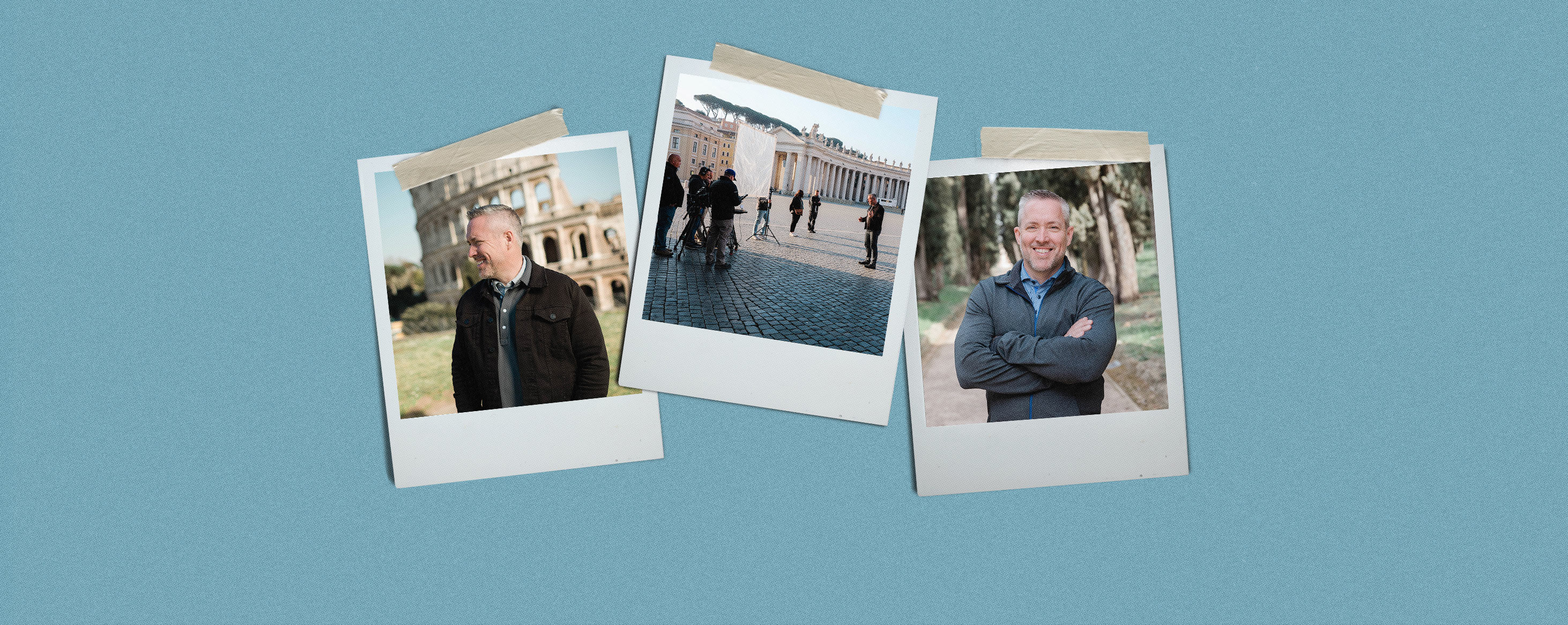

In the book of Romans, the apostle Paul gives readers the most in-depth, comprehensive explanation of the gospel in all of Scripture, showing us what it looks like to live according to the good news. And this good news is better than we could have imagined.
We sent a film crew with pastor J.D. Greear to Rome, Italy to film The Book of Romans: Part 1 and Part 2, a series examining one of the most important books ever written on the Christian faith. In this series, J.D. helps us see just how good the gospel really is. It exceeds all our expectations.
While filming, our team asked J.D. a few questions about preparing for this series and his hopes for small groups.
J.D.: One distinctive thing I think I re-learned as I was prepping for this series is just the distinctive message of grace that the gospel offers. The power of grace to transform our lives. Especially being on location here in Rome where you’re associated with so many different symbols of religion, and all the works-righteousness that goes into religion, and people doing things to try to earn God’s favor. Paul’s message in Romans is [righteousness] is a gift. Righteousness is not a standard that we obtain to; it’s a gift that God gives us. And then in response to that, out of love, we serve God, and we serve others. The power of the gospel, it was renewed in me, rekindled in me, not only as I studied and prepared for this but as I actually taught through it as well.
J.D.: One of the things I think I’m hoping—I’ve been hoping and praying for out of this study—is that this study of the book of Romans, which is one of the deepest and richest looks at the gospel anywhere in Scripture, would have this effect of not only getting us excited about the gospel and transforming our relationships but just burning in our hearts until we have to tell others. The gospel is kind of like a spiritual tornado, it never pulls you in without also wanting to thrust you back out. And so, I think just pressing into the beauties of God’s grace, it just does something to you that changes you so that you not only treat people differently and think about yourself differently, you just find yourself having to talk to other people about the things that you’re learning.
J.D.: So, the most memorable moment, spiritually, is probably going to be down in Paul’s prison. When we’re pretty sure it is the actual cell he stood in before he was executed, and just to think about that—that was amazing. I loved filming from there. You know, always my favorite memories with this are slow walking with Will (Senior Producer at RightNow Media). Just to follow me around with a camera, and just to kind of zoom in on my feet and to make me really self-conscious about my posture, "Am I walking crooked?" So, that definitely is what I’ll take away. Will’s got a special place in my heart.


At RightNow Media, our goal is to provide churches and student ministries with access to a library curated with the latest teaching for youth Bible studies from premier teachers. Including series like Not A Fan: Teen Edition by Kyle Idleman and a number of RightNow Media Originals, we have thousands of options for your Bible study. Here are five video Bible studies that are perfect for your youth group or student ministry—plus check out our youth Bible study roadmap to make curriculum planning a breeze.

Christians today face all kinds of challenges when it comes to understanding who they are and what they’re meant to do. There’s no shortage of options that claim to offer “truth.” If we aren’t careful, we can find ourselves chasing after popular opinion all the while neglecting the unchanging truth found in Scripture. In this four-session youth Bible study, pastor and author Francis Chan invites students into the power that comes from anchoring their identity in Christ.

Today’s world tells teens to walk around life with a mirror in front of their face. They question their looks, persona, and acceptance nonstop, thinking that one more post on social media might gain people’s attention. But God offers an alternative mirror. When God rules over our lives, he flips everything upside down. In this youth Bible study, Jonathan Evans will walk students through the parables in Luke to teach what it looks like for God to rule our lives.
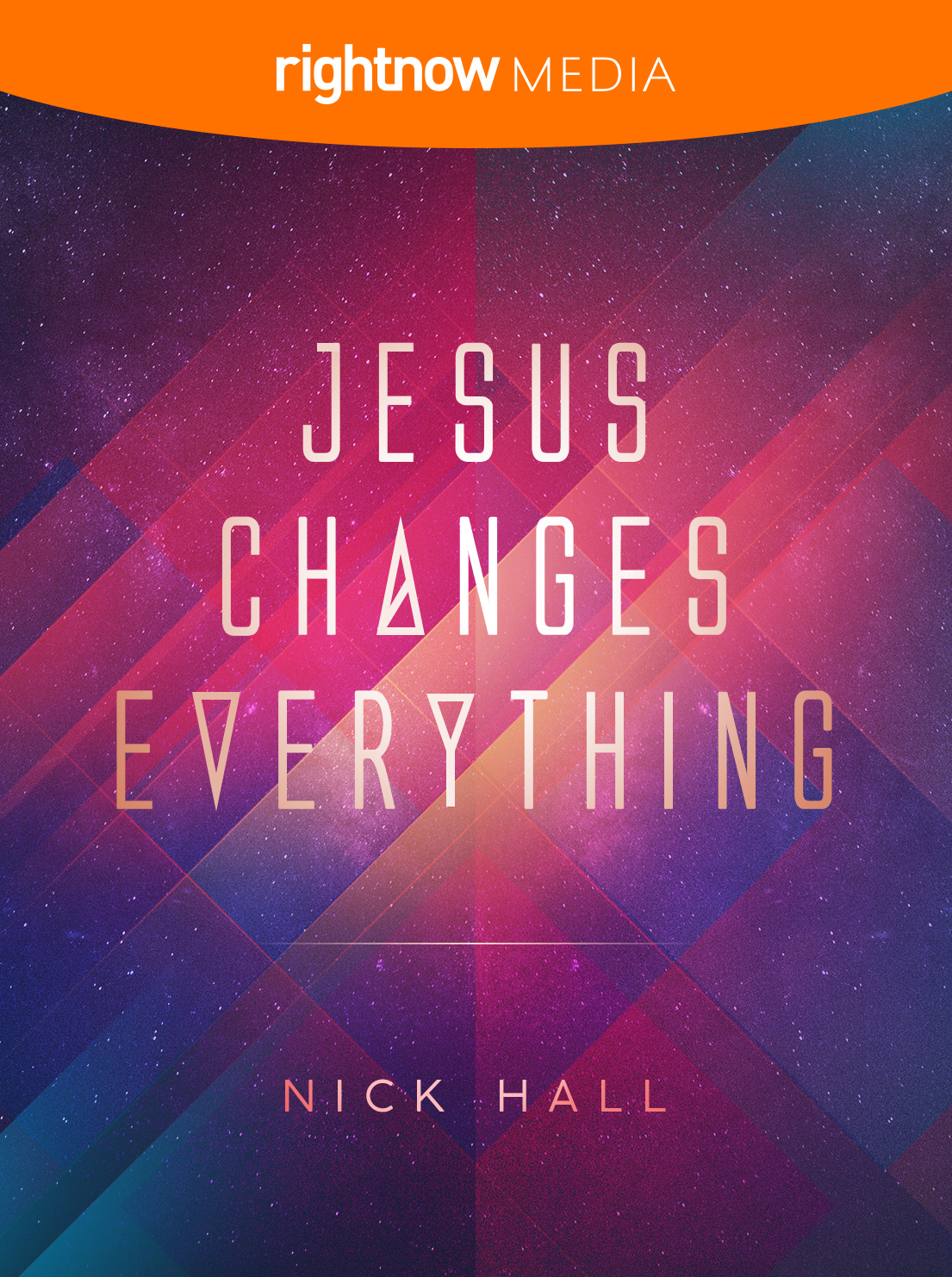
Teenagers often feel trapped. They’re stuck in the same habits, depression sets in, and they wonder about their purpose. The lie that nothing will ever change pulls teenagers deeper into the rut. But Jesus offers us a way out. In this four-part youth Bible study, Nick Hall talks to students about how a relationship with Jesus changes everything—our identity, relationships, habits, and mission.

Have you ever felt stuck? Sometimes life feels rigid—as if nothing could ever really change. Maybe we’re afraid of taking a step of faith. Or maybe we’re too injured from the past to move forward. No matter where you find yourself, you can make the most of today. In this inspirational series, Heisman Trophy winner Tim Tebow shares stories from his life to illustrate what it means to seize each day for God’s glory.

What do you want to be when you grow up? It was an easy question to answer when they were little, but life gets complicated for teen girls. When they get stuck in drama, discontentment, sadness, and shame, how can they even begin to look ahead to the future? In this four-part Bible study, Jennie Allen, founder of IF:Gathering, inspires teen girls to throw off everything that holds them back and be energized by God’s dream for them. Dreaming big starts now.


As we unpack our nativity scenes from eleven months of storage, placing Mary next to the manger is as normal as singing Christmas carols or watching Buddy the Elf eat gum off the subway railing.
For many of us, though, Mary never leaves the manger’s side. She goes back in storage with the wise men and reappears next year. While Mary serves the miraculous and cosmic role of birthing the Messiah, she is also a faithful witness of what it looks like to model Christ’s action of mediating between God and humanity—telling others what God is like and bringing him their concerns.
You may be thinking, “Wait, isn’t Jesus the only one who mediates between God and humanity?” And that instinct would be right. I’m not talking about mediating salvation between God and people—that’s something that only Jesus in his life, death, and resurrection has accomplished. What I am saying is that, like the prophets in the Old Testament standing as a go-between by proclaiming God’s message to the people and representing the people’s requests to God, Mary shows us how to occupy the space between God and the world as a light that points people to God.
Before traveling to Bethlehem for Jesus’s birth, Mary visited her cousin, Elizabeth, who was also miraculously pregnant. Elizabeth recognized Mary’s unique role as the “mother of [her] Lord” (Luke 1:43) and pointed toward Mary’s faith that God would “fulfill what he has spoken to her” (Luke 1:45).
In response, Mary launched into her famous speech magnifying God’s character—the Magnificat. These ten verses are more than Mary simply responding to her situation with gratitude. Mary shares God’s words not only with Elizabeth but also with us as readers thousands of years later.
Many commentators say Mary’s speech falls in the genre of prophecy. In essence, a prophet served as a mediator between God and people to provide the people with revelation of who God is. Mary comments on her own “humble condition” (Luke 1:48) and how God exalts the “lowly” (Luke 1:52), like herself. By describing herself in these terms, Mary speaks to those who may similarly feel overlooked or unimportant—much like how the people of Israel likely felt at the time of Jesus’s birth. Mary says that God has “helped his servant Israel, remembering his mercy to Abraham and his descendants forever” (Luke 1:54–55) with Jesus’s birth announcement, reminding God’s people that he cares and acts on their behalf.
Through her speech, Mary stepped into the space between God and his people by proclaiming the good news that God’s “mercy is from generation to generation” (Luke 1:50) and that “he has scattered the proud . . . [and] toppled the mighty from their thrones” (Luke 1:51–52). She reminds us that God “has satisfied the hungry with good things and sent the rich away empty” (Luke 1:53). Her song reads like many of the psalms in the Old Testament that proclaim the character of God to people in desperate need.
Mary models how we should be little mediators of God’s presence on earth—declaring his good news to people who need to hear it.
The beginning of Jesus’s public ministry provides a stage for Mary to stand as a type of mediator outside of the Christmas story. Before Jesus began teaching and demonstrating his identity as Israel’s Messiah, he and his disciples were invited to a wedding Mary also attended. As John writes in John 2:1–12, the wine for the wedding in Cana ran out and presented the host family with a problem.
Running out of wine at a celebration in Ancient Near Eastern culture was a social faux pas that would have brought enormous shame on the host family. Seeing this risk and interceding on behalf of the wedding party, Mary went to Jesus with a request without a question, “They don’t have any wine” (John 2:3).
Not only did Mary initiate stepping in as an in-between for the wedding party, but she also went straight to the person she knew could act, revealing her faith. She saw a need and entrusted it to the person who could meet that need.
While Jesus’s response appears harsh (his calling Mary “woman” isn’t derogatory or dismissive as he uses the same word when speaking tenderly to her on the cross in John 19:26), Jesus explained that he was hesitant because he had not begun to reveal his identity as Messiah—which Mary presumably knew—to everyone.
Instead of feeling rejected, Mary reaffirmed her faith in her son by telling the servants to do whatever Jesus told them to do. Jesus may have chosen not to act and told the servants to stand by, but Mary accepted that possibility and left the decision in Jesus’s capable hands. In doing so, she communicated an important truth not only for the servants at the wedding but also for us reading the passage today—obey God regardless of what he calls you to do. Mary advocated for people who had nowhere else to go and instructed them on how they should respond to God’s command—much like how the church operates in the world today.
Maybe it is appropriate that we think of Mary most often during the Christmas season. Christmas often calls us to act in mediatory ways.
This may be someone’s first Christmas alone, and they need to hear from you that God sees them. Perhaps this Christmas someone received bad news and needs you to advocate for them on your knees in prayer. By imitating Mary as she imitates Christ, we can be God’s ambassadors, channeling his overpowering love for them.


As the senior producer, Courtney Davis spent weeks scouting locations, double-checking equipment, planning car rentals and logistics, and scheduling her team to make sure everything went smoothly. “We brought extra people to make sure we could get everything shot. We had people at multiple locations ready to go so Bob could get the shot and move on. We normally have more time—a couple of days at least—so we were ready for the shoot to be stressful.”
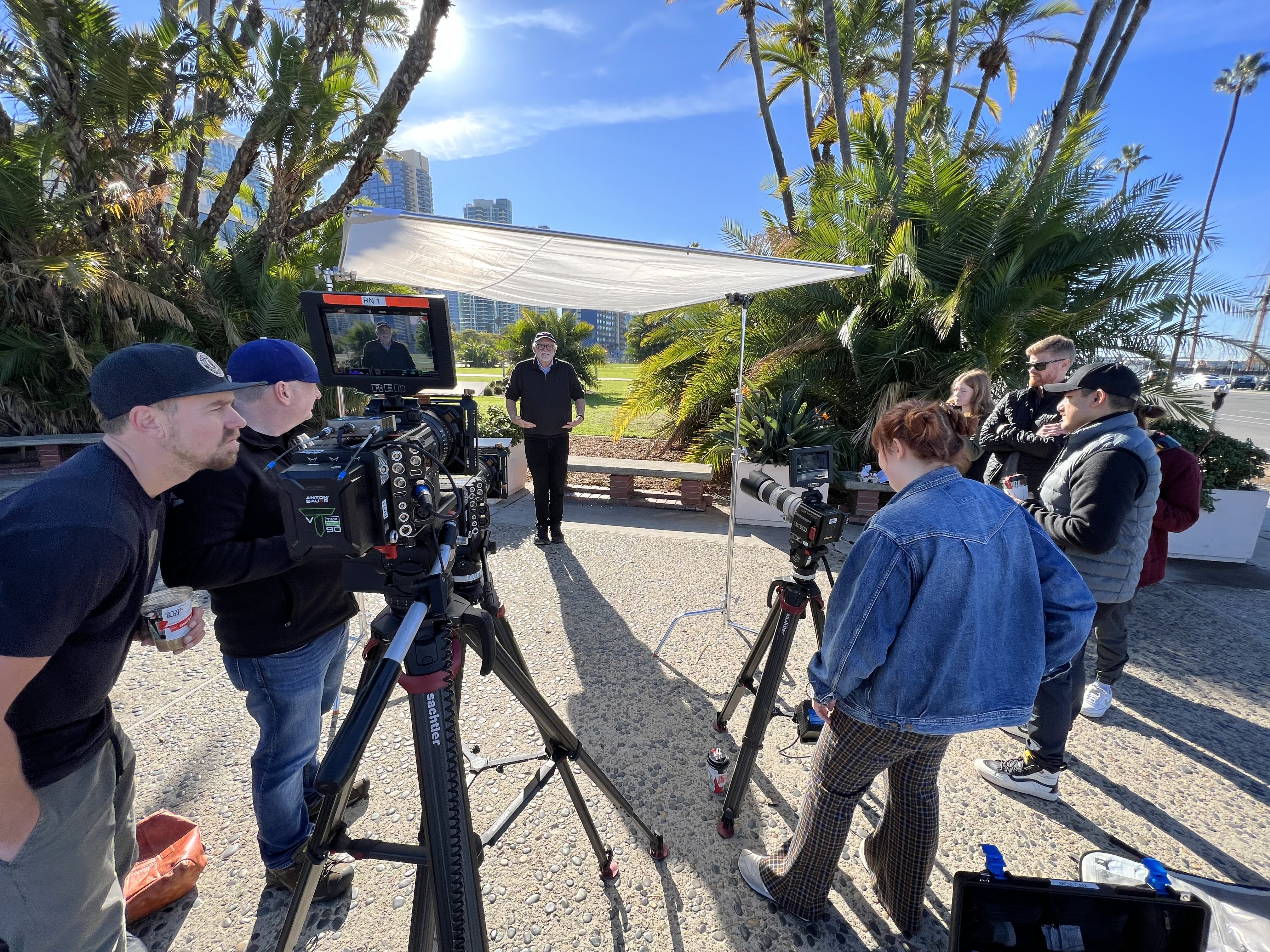
When our video team spoke about their time with Bob, they didn’t talk about the logistics of a one-day shoot, the California traffic, or catching connecting flights. Instead, they told stories about Bob’s cars (every car in Love In Chaos is one of Bob’s) and how four sailors, all of whom were also named Bob, taught Bob Goff to raise the sails on a pirate ship. Then, how the ship’s owner had to stop Goff from climbing the ship’s mast.
A difficult day became fun. But Bob was more than an energetic person; he wanted to get to know the people he was working with.
“Bob was so kind, so engaged—the Bob you meet in his books is who he really is,” Courtney said.
“He wanted to take pictures with us! We’re usually the ones asking to take pictures at the end of a shoot.”
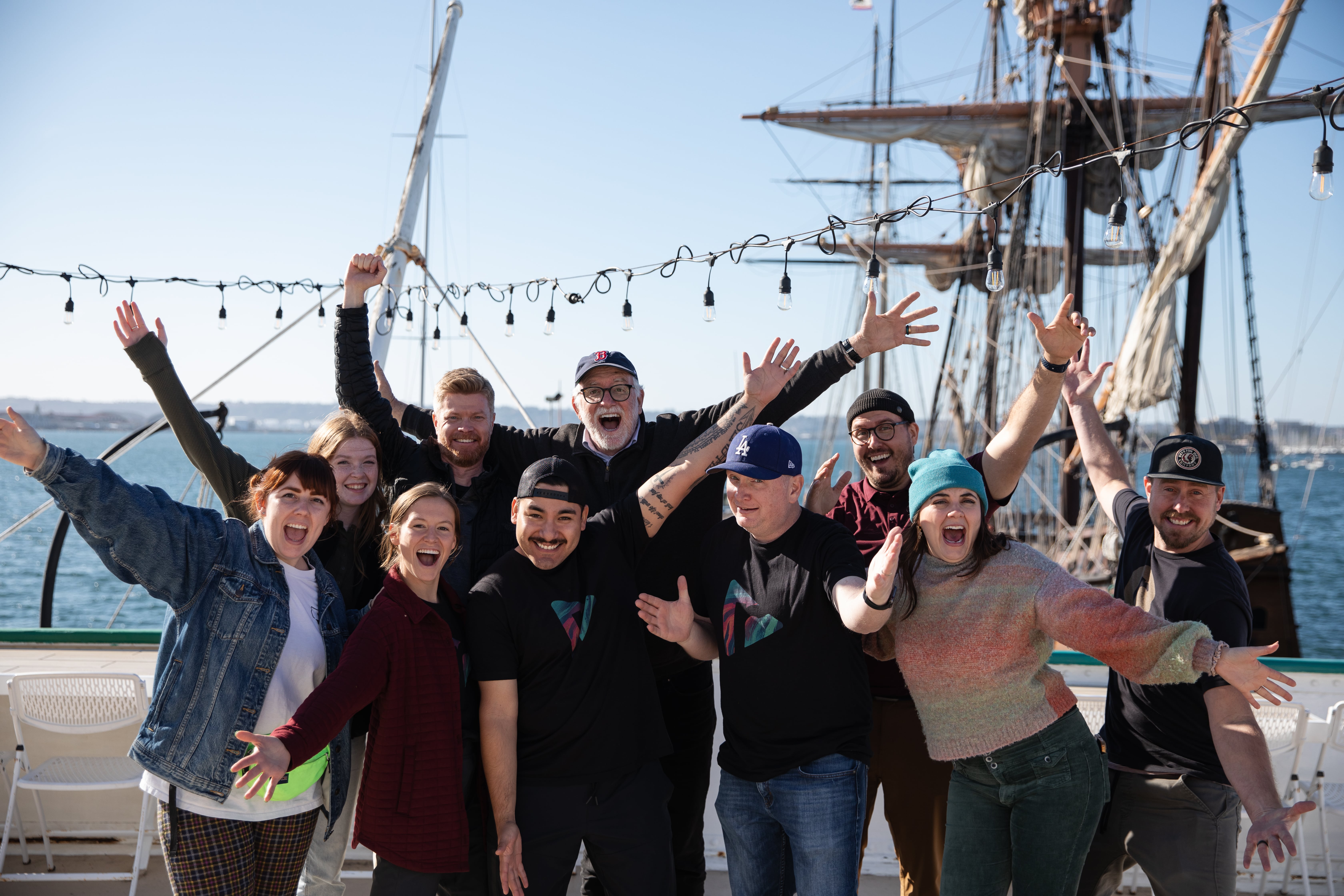
We are so used to being wary of strangers or assuming the worst of people online that encountering someone like Bob—someone who genuinely cares for the people around him—is refreshing, life-giving, and makes us wonder, “What’s different about you?” There is something irresistible about a person who loves Jesus in today’s world.
What if we, like Bob, made a point to let everyone around us know that we care about them, even those we disagree with? What if we swapped the division of our culture for the love of Jesus? That’s what Love In Chaos is all about.
What our production team captured in San Diego became a series that will exhort and encourage Christians to get out of their comfort zones for the sake of the gospel. “We’re so used to getting on social media and just seeing a lot of arguing,” Courtney said.
“But Bob encourages us in this series to actively care for the people around us. Jesus calls us to love people who are hurting, and I hope this series helps us do that more.”
When asked about how long the shoot day was, Courtney laughed. “We actually wrapped an hour early, which never happens.”
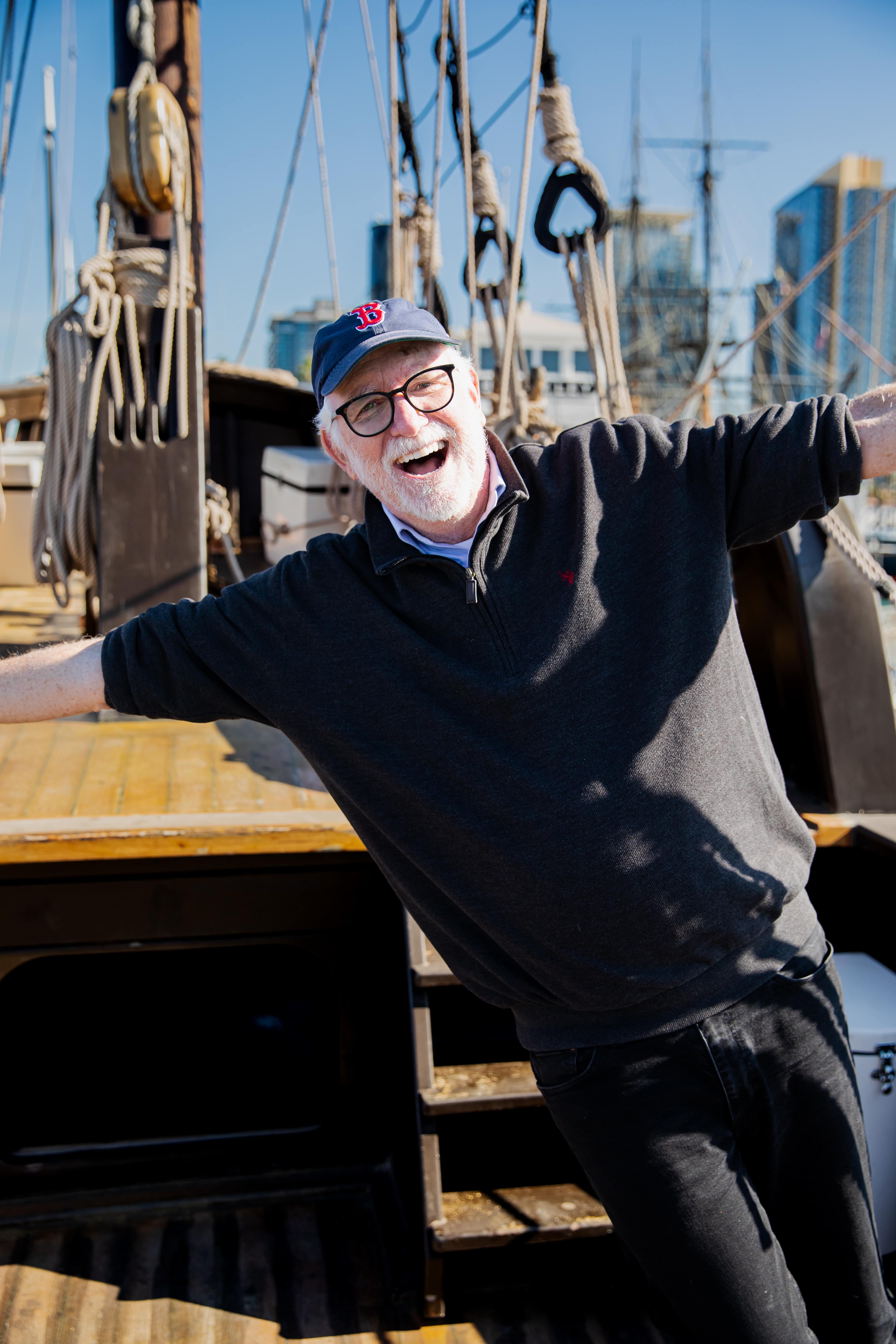


The book of Hebrews can be intimidating. It is long, theologically dense, and full of cultural references that feel distant from our everyday lives. So, sadly, many of us keep our distance from this rich and encouraging book. But not Dr. Derwin Gray.
Derwin spent time with our production team in North Carolina filming our new series, The Book of Hebrews, an eight-part series walking through the thirteen chapters of Hebrews. We caught up with Derwin Gray after he preached at our recent Men's Conference to hear about his experience making this series and his hope for everyone who watches it.
Derwin: Filming with the RightNow Media crew was awesome! Not only are they professional, they are genuinely good people who love Jesus. We worked hard, but we had a lot of fun. They also helped me find some new fishing spots to catch bass. I enjoyed being around them—I feel like I made friends [working on this study]. It’s always a good thing when you can make friends and talk about Jesus while making content that helps other people make friends and talk about Jesus as well.
Derwin: Hebrews is a pensive, beautiful book that calls us to the ancient way of following Jesus in the midst of circumstances that are not going your way. There was a great deal of persecution and a great deal of suffering [in the ancient church] and the Holy Spirit led the author of Hebrews to communicate, “Trust his grace.” Jesus is the image of the invisible God, the radiance of his glory. While preparing for this study, my picture of Jesus got bigger.
Derwin: I want people to walk away from this study saying, “I had no idea Jesus was so lifegiving, powerful, near, and present.” I want people to understand that we can approach his throne of grace and mercy in our time of need. Jesus’s grace is infinite—it never runs out.



